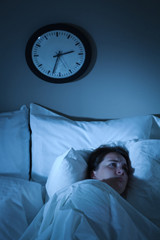Harvard Health Blog
Follow the poodle? Alternatives to prescription sleep medications

A contemporary author once wrote, "The night is the hardest time to be alive and 4 a.m. knows all my secrets." If you haven't been sleeping well for a while, this quote might feel like your new reality. You might even find yourself tempted by the happy poodles and free-floating butterflies on TV imploring you to ask your doctor about their new drugs for insomnia. But, before answering their siren call, you pause. You notice the side effects are rattled off rapidly and are difficult to understand. You are worried about being "hooked" on them forever. You ask yourself, is there another way to get better sleep? The answer is an emphatic "Yes!"
CBT: A clear winner for insomnia
Sleep specialists now agree that behavioral (non-drug) techniques should be the first approach to treatment of most cases of chronic insomnia. The best studied of these is cognitive behavioral therapy, or CBT. The goal of CBT is to address harmful behaviors and misbeliefs that are causing and perpetuating insomnia. Components of CBT include restricting time in bed, disrupting the negative association between failure to sleep and the bedroom environment, and correcting any negative or inaccurate beliefs about sleep.
In large-scale studies, CBT has been shown to be equally effective as drug treatment for insomnia. Importantly, improvement in sleep is longer-lasting after CBT than with drug treatment or the combination of drug treatment and CBT. Until recently, the use of CBT, which normally requires several in-person sessions, has been limited because of the lack of qualified therapists. However, studies now have shown that brief interventions (using only 1-2 sessions) as well as therapy administered via online programs can be as effective as conventional CBT.
Relaxation therapy also can be effective for insomnia treatment. However, although improving sleep hygiene (e.g., limiting caffeine, alcohol, tobacco, and exercise close to bedtime) is effective when incorporated into CBT, it's not effective when used alone, without being part of a larger treatment plan.
What about other complementary therapies?
Non-conventional or complementary and alternative medicine (CAM) approaches are used by approximately 45% of Americans with insomnia. Such remedies include herbal or natural products (e.g., valerian, melatonin), yoga, and acupuncture. But are CAM therapies effective and worth your time and money?
Unfortunately, there have been relatively few studies of CAM therapies for insomnia, and most of them have not been done well. However, acupressure, tai chi, yoga, and other mind-body activities can be effective, but the status of acupuncture and L-tryptophan is unclear. There is no or little evidence that herbal compounds (valerian, chamomile, kava, wuling), aromatherapy, and homeopathy are useful. As for melatonin, it is useful for the treatment of circadian or body rhythm disorders; its role as a therapy for insomnia has not been clearly established.
The bottom line for getting more shut-eye — without any butterflies
Chronic insomnia affects approximately 10% of Americans and results in poorer quality of life. Behavioral or non-drug approaches are effective and should be the initial treatment. A few CAM remedies have been shown to be useful, but most are not. Moreover, you should be aware that most claims about the effectiveness of CAM treatments for insomnia are not supported by good evidence.
Disclaimer:
As a service to our readers, Harvard Health Publishing provides access to our library of archived content. Please note the date of last review or update on all articles.
No content on this site, regardless of date, should ever be used as a substitute for direct medical advice from your doctor or other qualified clinician.















